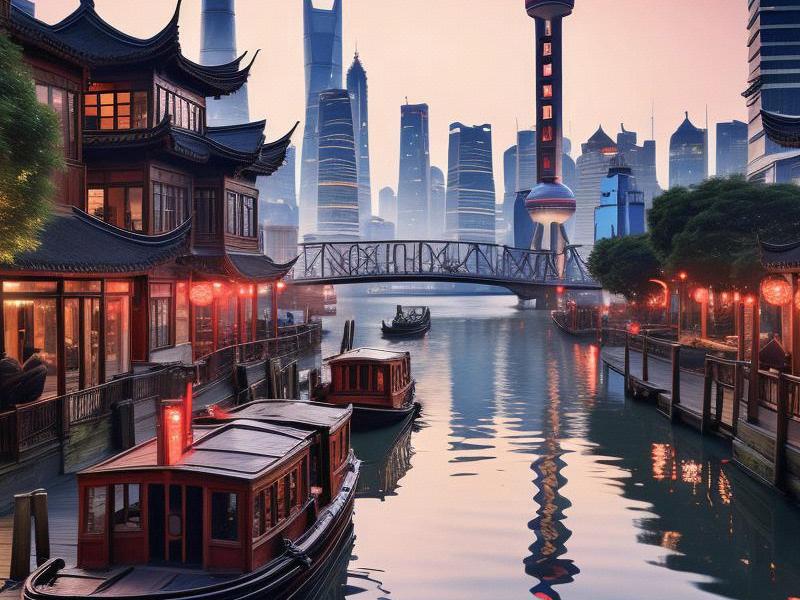
Shanghai, often referred to as the "Pearl of the Orient," has long been a symbol of China's rapid economic development. Over the past few decades, the city has undergone a profound transformation, evolving from a historic port city into a global metropolis that is a beacon of culture, technology, and economic innovation. This article will explore the cultural renaissance of Shanghai and the strides it has made in technological advancement, reflecting on how these changes have shaped the urban landscape and the lives of its residents.
The cultural evolution of Shanghai is a fascinating tale of tradition meeting modernity. Once known as the "Paris of the East," Shanghai was a melting pot of cultures, where Chinese, Western, and colonial influences coexisted. The Bund, with its historic architecture, and the French Concession, with its charming cobblestone streets and European-style buildings, are testaments to this rich history. Today, these areas have been revitalized, blending historical charm with modern aesthetics.
The city's cultural scene has flourished in recent years, with a surge in art galleries, theaters, and cultural festivals. The Shanghai Museum, one of the largest and most prestigious museums in China, houses an impressive collection of Chinese art, including ancient ceramics, calligraphy, and paintings. The city also hosts the Shanghai International Film Festival, which attracts filmmakers and cinephiles from around the world.
In addition to preserving its historical heritage, Shanghai has embraced contemporary culture. The city is home to numerous contemporary art galleries, such as the Power Station of Art, which is the first state-run museum dedicated to contemporary art in China. The M50 Creative Park, located in the former site of a textile factory, has become a hub for artists and art lovers, featuring over 100 galleries and studios.
上海龙凤阿拉后花园 The cultural renaissance of Shanghai is not limited to the arts. The city has also made significant strides in education and cultural exchange. Fudan University and Tongji University, two of China's top universities, are located in Shanghai, attracting students and scholars from around the world. The city's international schools and language institutions provide a platform for cultural exchange, fostering a global perspective among its residents.
While Shanghai's cultural evolution is remarkable, its technological advancement is equally impressive. As one of China's four municipalities directly under the central government, Shanghai has been at the forefront of the country's economic reform and opening-up. The city has established itself as a global financial hub, with the Shanghai Stock Exchange being one of the largest in the world.
In recent years, Shanghai has embraced the digital economy, becoming a leader in artificial intelligence, big data, and other emerging technologies. The city's Zhangjiang Hi-Tech Park is home to numerous high-tech companies and research institutions, fostering innovation and entrepreneurship. The ShanghaiTech University, a collaboration between the Chinese Academy of Sciences and the city government, is dedicated to advancing research and education in science and technology.
上海品茶论坛 The city's commitment to technological innovation is evident in its smart city initiatives. Shanghai has implemented various smart city projects, such as intelligent transportation systems, digital healthcare, and smart urban management. The city's metro system, one of the busiest in the world, uses advanced technology to ensure efficient and reliable service. The Shanghai International Airport, the busiest airport in China, employs cutting-edge technology to enhance passenger experience and operational efficiency.
The integration of technology into everyday life has transformed the lives of Shanghai's residents. E-commerce platforms like Alibaba and JD.com have revolutionized the way people shop, while mobile payment systems like Alipay and WeChat Pay have made transactions seamless and convenient. The city's residents enjoy access to high-speed internet, enabling them to stay connected and informed in an increasingly digital world.
The economic transformation of Shanghai is closely linked to its cultural and technological evolution. As a major center of trade and commerce, the city has attracted numerous multinational corporations and foreign investors. The Shanghai Free Trade Zone, established in 2013, has further enhanced the city's position as a global trade hub. The zone offers various incentives, such as tax breaks and simplified administrative procedures, to encourage foreign investment and trade.
爱上海419 The city's economic transformation has also led to significant urban development. Shanghai has invested heavily in infrastructure, including transportation, housing, and public services. The city's skyline is dominated by iconic skyscrapers like the Shanghai Tower, which is the tallest building in China and the second tallest in the world. The development of Pudong, once a rural area on the eastern bank of the Huangpu River, into a modern financial district is a testament to the city's urban planning and development efforts.
The economic transformation of Shanghai has had a profound impact on the lives of its residents. The city offers a wide range of employment opportunities, attracting talent from across the country and abroad. The standard of living in Shanghai has improved significantly, with residents enjoying access to quality education, healthcare, and cultural amenities. However, the rapid urbanization has also brought challenges, such as housing affordability and environmental sustainability.
In conclusion, Shanghai's renaissance is a story of cultural evolution, technological advancement, and economic transformation. The city has successfully blended its rich historical heritage with modern innovation, creating a vibrant and dynamic urban environment. The cultural renaissance of Shanghai is reflected in its thriving arts scene, commitment to education and cultural exchange, and preservation of historical landmarks. The city's technological advancement is evident in its leadership in the digital economy, smart city initiatives, and integration of technology into everyday life. The economic transformation of Shanghai has led to significant urban development, attracting talent and investment, and improving the standard of living for its residents.
As Shanghai continues its journey towards becoming a global hub of culture, technology, and economic innovation, it faces both opportunities and challenges. The city must balance its rapid development with the need for sustainable urban planning and environmental conservation. By embracing innovation and fostering a global perspective, Shanghai can continue to thrive as a beacon of progress and prosperity in the 21st century.
